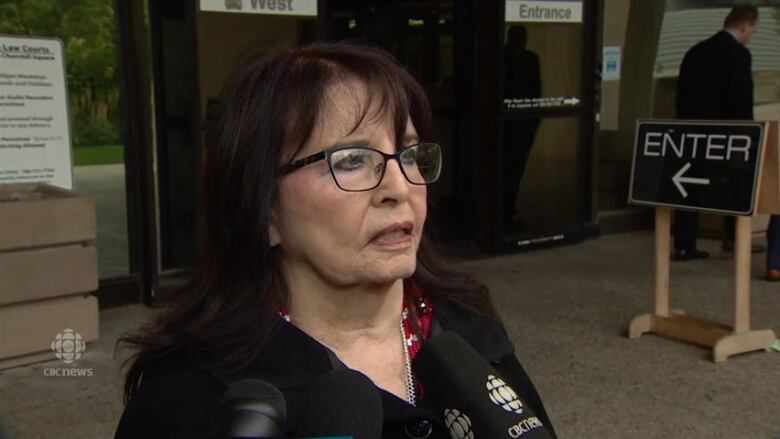Question of race in sex assault victim's jailing 'keeps me up at night,' Alberta justice minister says
Kathleen Ganley says Indigenous woman's treatment should never happen to anyone again
Alberta Justice Minister Kathleen Ganley says the case of an Indigenous sexual assault victim who was jailed for five days while she testified against her attacker raises questions about whether her race played a role in the decisions that were made.
"It is difficult to comment on the motivations of the individuals acting within the system," Ganley said at a news conference Monday.
"That being said, I think one of the questions that keeps me up at night is whether this would have been the case if this woman was Caucasian and housed and not addicted, whether this would have happened to her."
A committee set up by Ganley to recommend policies includes Grace Auger, a lawyer who is the former vice-president of the Indigenous Bar Association.
CBC News first reported Monday on how the woman from Maskwacis, Alta., was treated at a preliminary hearing in June 2015.
The woman — CBC is calling her Angela Cardinal because her real name is protected by a publication ban — was savagely attacked, stabbed and sexually assaulted by a notorious sexual predator, Lance Blanchard.
Cardinal was ordered into custody under Section 545(1) of the Criminal Code, which permits a judge to imprison a witness who refuses to co-operate during a preliminary inquiry.

The request was made by Crown prosecutor Patricia Innes on the first day of the hearing because Cardinal kept falling asleep and had trouble focusing and answering questions. The order was granted by provincial court Judge Raymond Bodnarek.
Cardinal spent five nights at the Edmonton Remand Centre while she testified. She shared a van with Blanchard between the remand centre and the courthouse on at least two occasions. During court breaks, she was placed in a cell close to her attacker.
'No exceptions will be made'
She was also brought into the courtroom wearing leg shackles.
"There weren't any policies in place to indicate she shouldn't have been shackled," Ganley said. "Now, that being said, I'm a little surprised that no one looked at the case and said that this isn't appropriate."
Cardinal died in an unrelated shooting seven months after the preliminary hearing.
Blanchard was later found guilty of aggravated assault, kidnapping, unlawful confinement, aggravated sexual assault, possession of a weapon and threatening to cause death or bodily harm.
Ganley announced a number of measures Monday to ensure that what happened to Cardinal in the justice system never happens again.
Minister apologizes to family
In addition to the committee, Ganley has appointed Roberta Campbell, a veteran criminal lawyer and outgoing president of the Law Society of Manitoba, to conduct an independent investigation.
Ganley said the chief Crown prosecutor must now approve any decision by a Crown prosecutor to use Section 545(1) of the Criminal Code.
"No exceptions will be made," Ganley said.
The minister said she is still finalizing a timeline for Campbell's investigation but said she wants it completed as soon as possible.
Ganley first learned about the case from CBC News. Last week, she apologized to Cardinal's mother for how her daughter was treated. She said Victim Services will be working with Cardinal's family.
Treated as 'less than human'
Muriel Stanley Venne, president and founder of the Edmonton-based Institute for the Advancement of Aboriginal Women, told CBC News she was horrified and disgusted when she learned how Cardinal had been treated by the justice system.
"If she had not been an Aboriginal woman, she wouldn't have been treated this way," Stanley Venne said.

"If she wasn't Aboriginal, I believe she would have been treated with sympathy and empathy for what had happened to her," she added.
"This is part of the way Aboriginal women are treated — as less than human beings, and therefore not requiring the respect and dignity that any human being should be receiving in the courts."
Progressive Conservative house leader Ric McIver said he is concerned that race factored into how Cardinal was treated.
"I'm not sure a white woman in all cases would have been treated the same way this Aboriginal woman was treated. No person should be treated that way, to be clear," he said.
"If women of certain race or background are getting treated because of their race or background, that is inexcusable."
Brian Jean, leader of the Wildrose Official Opposition, also expressed concern.
"We have now found that that person is an Aboriginal woman, a homeless person. I certainly think just because that's the situation, it's no excuse at all for this kind of behaviour," he said.
With files from the CBC's Janice Johnston
